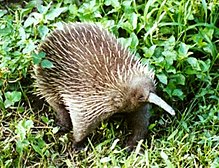Long-beaked echidna
The long-beaked echidnas make up one of the two genera (Genus Zaglossus) of echidna. Echidna is a spiny monotreme that lives in New Guinea. There are three living species, and two extinct ones.
| Long-beaked echidnas[1] Temporal range: Miocene to present
| |
|---|---|

| |
| Western long-beaked echidna (Zaglossus bruijni) | |
| Scientific classification | |
| Domain: | Eukaryota |
| Kingdom: | Animalia |
| Phylum: | Chordata |
| Clade: | Synapsida |
| Class: | Mammalia |
| Order: | Monotremata |
| Family: | Tachyglossidae |
| Genus: | Zaglossus Gill, 1877 |
| Type species | |
| Zaglossus bruijni | |
| Species | |
|
Zaglossus attenboroughi | |
Echidnas are one of only two types of living mammals that lay eggs.
Species
changeZaglossus attenboroughi
change- Habitat: regions of New Guinea at higher elevation than highland forests
- Era: the present
- Status: Endangered
Remarks: Species described from one sample only. May be endangered, or locally extinct. See Sir David's Long-beaked Echidna
Zaglossus bartoni
change- Habitat:on the central cordillera between the Paniai Lakes and the Nanneau Range, as well as the Huon Peninsula
- Era: the present
- Status: Endangered
Remarks: see Eastern Long-beaked Echidna
Zaglossus bruijni
change- Habitat: highland forests of New Guinea
- Era: the present
- Status: Endangered
Remarks: see Western Long-beaked Echidna
Zaglossus hacketti
change- Habitat: Western Australia
- Era: Upper Pleistocene
Remarks: This species is known only from a few bones. At a metre long, it was huge for an echidna and for monotremes in general.
Zaglossus robustus
change- Habitat: Tasmania
- Era: Pleistocene
Remarks: This species is known from a fossil skull about 65 cm long.
References
change- ↑ Groves, C.P. (2005). "Order Monotremata". In Wilson, D.E.; Reeder, D.M (eds.). Mammal Species of the World: A Taxonomic and Geographic Reference (3rd ed.). Johns Hopkins University Press. pp. 1–2. ISBN 978-0-8018-8221-0. OCLC 62265494.
- Flannery, T.F. and Groves, C.P. 1998 A revision of the genus Zaglossus (Monotremata, Tachyglossidae), with description of new species and subspecies. Mammalia, 62(3): 367-396
Other websites
change- EDGE of Existence (Zaglossus spp.) Archived 2007-12-25 at the Wayback Machine - Saving the World's most Evolutionarily Distinct and Globally Endangered (EDGE) species
- Long-beaked echidna from ARKive
Facts Status Description Range Habitat Biology Threats Conservation Find out more Glossary References View all